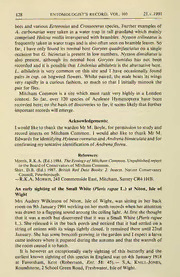
An early sighting of the small white (Pieris rapae L.) at Niton, Isle of Wight PDF
Preview An early sighting of the small white (Pieris rapae L.) at Niton, Isle of Wight
128 ENTOMOLOGIST'S RECORD, VOL. 103 21.v.1991 bees and various Ectemnius and Crossocerus species. Further examples of A. carbonarius were taken in a water trap in tall grassland which mainly comprised Holcus mollis interspersed with brambles. Nysson trilineatus is frequently taken in water traps and is also often seen on bramble leaves. So far, I have only found its normal host Gorytes quadrifasciatus on a single occasion but G. bicinctus is present in low numbers. Nysson dimidiatus is also present, although its normal host Gorytes tumidus has not been recorded and it is possible that Lindenius albilabris is the alternative here. L. albilabris is very common on this site and I have occasionally found pairs in cop. on hogweed flowers. Whilst paired, the male beats its wings very rapidly in a curious fashion, so much so that I initially mistook the pair for flies. Mitcham Common is a site which must rank very highly in a London context. So far, over 120 species of Aculeate Hymenoptera have been recorded here; on the basis of discoveries so far, it seems likely that further important records will emerge. Acknowledgements: I would Hke to thank the warden Mr M. Boyle, for permission to study and record insects on Mitcham Common. I would also like to thank Mr M. Edwards for identifying Hylaeuscornutusand Andrena bimaculataand for confirming mytentative identification ofAndrenaflorea. References: Morris, R.K.A. (Ed.) 1984. TheEcologyofMitcham Common. Unpublished report to the Board ofConservatorsofMitcham Common. Shirt, D.B. (Ed.) 1987. British Red Data Books: 2. Insects. Nature Conservancy Council, Peterborough. —R.K.A. Morris, 241 Commonside East, Mitcham, Surrey CR4 IHB. An early sighting of the Small White (Pieris rapae L.) at Niton, Isle of Wight Mrs Audrey Wilkinson of Niton, Isle of Wight, was sitting in her back room on 9th January 1991 working on her moth records when her attention was drawn to a flapping sound aroung the ceihng light. At first she thought that it was a moth but discovered that it was a Small White (Pieris rapae L.). She released it in the back porch and noticed that it had settled on a string of onions with its wings tightly closed. It remained there until 22nd January. She has some broccoli growing in the garden and I expect a larva came indoors where it pupated during the autumn and that the warmth of the room caused it to hatch. It is however an exceptionally early sighting of this butterfly and the earliest known sighting of this species in England was on 4th January 1918 at Faversham, Kent (Robertson, Ent. 51: 45).— S.A. Knill-Jones, Roundstone, 2 School Green Road, Freshwater, Isle ofWight.
